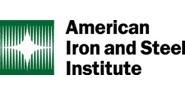Market Data

February 9, 2016
Trade Crisis Focus of AISI 2016 Policy Agenda
Written by Sandy Williams
WASHINGTON, D.C. – The American Iron and Steel Institute (AISI) Board of Directors this week approved the Institute’s 2016 Public Policy Agenda during its meeting in Washington, D.C. The Agenda outlines aggressive pro-manufacturing policy strategies to guide advocacy for the upcoming year and highlights the importance of the steel industry to the U.S. economy and our national security.
Thomas J. Gibson, president and CEO of AISI, said, “In 2014 and into 2015 the industry experienced a significant financial downturn as a result of the continuing surge in dumped and subsidized imports coming into the U.S. market from around the world. Steel imports increased by 36 percent in 2014 and captured a record 28 percent of our steel market. The situation worsened in 2015 with finished steel imports capturing 29 percent of the U.S. steel market, an all-time record. Our 2016 Public Policy Agenda highlights the North American steel industry’s support of a national pro-manufacturing agenda to ensure that U.S. manufacturing is globally competitive and that we keep manufacturing jobs in America.”
Highlights of the public policy priorities include AISI positions that:
– International Trade: More aggressive efforts should be made by the U.S. government to combat the current steel crisis, challenge foreign trade distorting practices and ensure effective enforcement. In order to fully address Chinese dumping, China should continue to be treated as a non-market economy until it establishes that it is no longer a state-controlled economy and demonstrates it meets all
– Tax: Reforms of the tax code should produce real economic growth and job creation, not just redistribute which sectors of the economy have a greater tax burden. We should prohibit any retroactive tax increase, eliminate the corporate alternative minimum tax and maintain tax provisions that are critical to manufacturing competitiveness.
– Energy Policy: Oil and natural gas from shale formations are strategic resources that have created economic opportunities. We must ensure federal regulations on energy development do not threaten affordability and reliability of energy and support breakthrough research.
– Environment and Regulatory: We must examine the impact of proposed environmental regulations on industrial competitiveness, seek greater emphasis on cost/benefit analysis; and, encourage greater transparency and industry access to the regulatory development process at the Environmental Protection Agency (EPA) and state agencies.
– Transportation Infrastructure: Although a five year highway bill was passed by Congress, long-term and sustainable funding for highways is still a priority for the steel industry, as is funding water resources development projects and providing relief for truck drivers from overly burdensome regulations.
– Workforce Policy: Pursuing cooperative government-industry approaches to promote worker health and safety, on both the legislative and regulatory fronts, is a priority for workplace safety. The policy plan supports adequate cost/benefit analysis of all workforce regulations and support of workforce educational programs to prepare the next generation of the workforce.
(An AISI Press Release)







